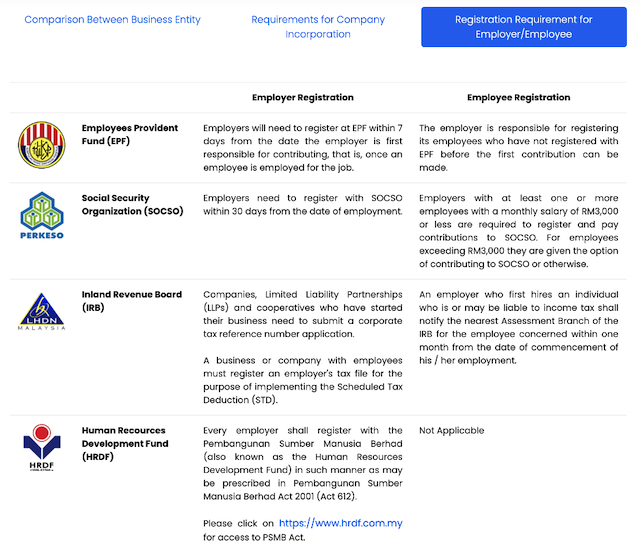Do you have a great idea for a new business? Or, perhaps you’re just ready to strike out on your own instead of working for someone else.
Either way, launching your entrepreneurial journey is an exciting time filled with opportunities and challenges. Starting a business in Malaysia can be rewarding, given its strategic location, diverse economy, and business-friendly environment. However, you may not be exactly sure how to start a business in Malaysia. Navigating the process of setting up a business can be complex, especially with the various legal and regulatory requirements involved.
That’s why we’ve created this comprehensive guide to help you understand the necessary steps to get your business up and running in Malaysia. From selecting the appropriate business structure and registering your company to securing the necessary licenses and understanding tax obligations, we cover everything you need to know. It includes the necessary steps everyone will need to follow to get their business up and running.
By the end of the article, you will have a clearer understanding of the process and be well-prepared to embark on your entrepreneurial journey. Our goal is to provide you with the knowledge and tools needed to turn your business idea into a successful Hopefully, you’ll have a much clearer understanding of how to start your own business!
If you’re ready to take the plunge and start your own business in Malaysia, let’s get started on this exciting journey together
Editor’s note: Are you ready to buy a domain name for your business website now? If so, head over here. Otherwise, read on!
Here are the steps to starting your own small or midsize enterprise (SME) in Malaysia:
1. Do your research and narrow down your business idea
Before you do anything else, spend some time focusing on your idea. What is your product or service and is there a demand for it? Who is your target customer? What about competition? Is there room in the market for your business? And how will you differentiate your product or service from the rest?
This is a great time to do market research to figure out if your idea is worth pursuing. And while you can write an entire business plan, you may not need it unless you’ll be seeking outside funding. However, you should at least create a simple one-page business plan to help solidify your concept.
Things to include in a one-page business plan:
- What your product or service is
- Your target market for your product or service
- The problem you’re solving for them
- SWOT analysis (strengths, weaknesses, opportunities, threats)
- Who will own and run the business
- How you will help your target market find out about your business
- How you will fund the launch of your business and sustain your operations
Get feedback on your business idea from friends and family. Just keep in mind that they likely won’t be your target customer. So, their opinions should be taken with a grain of salt.
If you can, look for opportunities to test your product or service before you launch. An example would be to try selling your goods at a farmers’ market (if you were a baker or candy-maker, for instance.) Find out what real customers think of your products. Then, use any feedback you gather to improve your product or service.
Your business name should be unique, memorable and fitting with your type of business.
Related: 4 popular home based business opportunities in Malaysia
2. Choose a business registration type
Next, you’ll need to choose which type of business to form when you start your business in Malaysia. The basic types to choose from are sole proprietor, partnership and company.
One of the biggest differences between these is that the first two don’t offer you any protections if something were to go wrong.
However, registering a company can protect you from some personal liability, should your business end up owing money. If in doubt, an experienced lawyer will be able to guide you to the right form of business for your needs.
Sole proprietor
This means that you alone will be running your business. You can use your own name or operate under a trade name such as ABC Enterprises, etc. The fee to register under your name is RM30/year, or RM60/year for a trade name.
Partnership
Registering as a partnership can be appropriate if you’re partnering with one or more people in the venture. In the case of a partnership, the risks and rewards of business ownership are shared. The registration fee is RM60/year.
Company
Registering a private or public limited company is the more complicated process out of these options.
Private limited companies are the most common form of company in Malaysia and are known locally as Sdn Bhd or Sendirian Berhad. Registration starts at RM1,000 but there may be other fees depending on your industry and other factors. You can ask an SSM officer for help or work with a lawyer who specializes in company formation.
2. Find a place to operate your business
If you’re starting a home-based business, you won’t need retail, commercial or industrial space. But if you’re launching a physical store, food and beverage outlet, or any business requiring more space, you’ll need to lease or buy a location to use.
You can search for available commercial properties on platforms like Property Guru and iProperty or enlist the help of a commercial real estate agency.
3. Start finding a name for your business
This is also a great time to brainstorm business name ideas. Once you have a short list of ideas, do a quick online search to see if the matching domain names are available. You’ll do an official business name search in the next step, but doing this first can save you time and money later.
Use GoDaddy’s domain name generator to jumpstart your brainstorming process for your business’s name.
Your business name should be unique, memorable and fitting with your type of business.
4. Find a place to operate your business (if i’s not online)
Finding a place to operate your business is crucial if your venture is not online-based. For those starting a home-based business, the need for retail, commercial, or industrial space may be minimal. However, if you are launching a physical store, a food and beverage outlet, or any business that requires more space, leasing or purchasing a location becomes necessary.
In Malaysia, there are several platforms such as Property Guru and iProperty where you can search for available commercial properties. Additionally, engaging a commercial real estate agency can provide professional assistance and tailored options to suit your business needs.
The costs associated with different types of commercial real estate vary. Retail spaces, commonly located in shopping malls and high streets, typically range from MYR 5 to MYR 25 per square foot per month. Office spaces in business districts or commercial buildings generally cost between MYR 4 and MYR 15 per square foot per month.
For industrial spaces, often found in industrial parks or on the outskirts of cities, the price range is usually MYR 1 to MYR 5 per square foot per month. Food and beverage outlets, especially those in prime locations like malls and food streets, can cost between MYR 6 and MYR 30 per square foot per month. Co-working spaces, which offer flexibility and are often located in central business districts, range from MYR 300 to MYR 800 per desk per month.
When selecting a property, consider factors such as location accessibility, target customer base, and future scalability. It is essential to verify the terms of the lease or purchase agreement thoroughly to ensure it meets your business requirements. Using these platforms and agencies will help you find a suitable location that aligns with your business goals and budget.
5. Name your business and register with SSM
Once you’re ready to make your business official, you’ll need to register the name and business with the authorities.
The first step to making your business official is to name it.
Start by doing a name search to ensure it’s available to use. This is done through SSM (Suruhanjaya Syarikat Malaysia) for RM30 per search.

6. Open a bank account
You’ll need to open a bank account for your business. Thankfully, there are many local banks to choose from, such as Maybank, CIMB, Public Bank Berhad, RHB, etc.
The documents you’ll need to open an account will vary depending on what form of business you’ve registered. You can find a list of Maybank’s requirements on their website.
7. Obtain necessary business licenses and permits
Proper licensing is required to operate any business in Malaysia. These can include:
- Business premise licenses
- Signage advertisement licenses
- Industry- or activity-specific licenses
For information on obtaining the licenses you need, head over to the Ministry Of Entrepreneur Development BLESS licensing page here.
8. Register your business with SOCSO, LHDN, EPF and HRDF
Depending on how many employees (if any) you plan to hire, you’ll need to register with some or all of these agencies:
SOCSO (Social Security Organisation), also known as PERKESO (Pertubuhan Keselamatan Sosial), is the government agency responsible for employee social security. You’ll need to register with SOCSO within 30 days if you hire one or more employees earning less than RM3,000 per month.
LHDN (The Inland Revenue Board). This is the agency responsible for collecting business taxes. All businesses must register an Income Tax File with the Inland Revenue Board.

EPF (Employees Provident Fund) manages retirement funds for private-sector workers. You’ll need to register with EPF within seven days of hiring an employee.
HRDF - Registration with the Human Resources Development Fund is required if you’re employing 10 or more Malaysian workers.
9. Build out your business
Now that you’ve taken care of all the official requirements, it’s time to actually build out your business.
If you’re opening a cafe, this would involve purchasing all of your food and beverage equipment, interior decor, signage, hiring staff, choosing suppliers and building your website, etc.
If you’re at this point and haven’t yet purchased the domain for your website, head here to secure it now. You can also use our powerful website builder to create a professional-looking website, even if you need e-commerce features.
Editor’s note: GoDaddy’s Website Builder has all you need to start and grow a small business — zero technical skills needed. Try it free today!
Become tax compliant
Corporate tax in Malaysia is a fundamental aspect of business taxation. Companies incorporated in Malaysia are subject to corporate income tax on income derived from Malaysia as well as worldwide income for resident companies.
The current corporate tax rate is 24%, although small and medium-sized enterprises (SMEs) benefit from a reduced rate of 17% on the first MYR 600,000 of chargeable income, with the remaining chargeable income taxed at 24%. It is crucial for businesses to maintain accurate financial records and submit annual tax returns to the Inland Revenue Board (LHDN) in a timely manner.
Goods and Services Tax (GST) in Malaysia is another critical component of the tax system. GST is a consumption tax levied on the supply of goods and services at each stage of the supply chain. Although Malaysia had previously implemented GST, it was replaced by the Sales and Services Tax (SST) in 2018.
Businesses must keep abreast of any changes in tax legislation, as the reintroduction of GST has been a topic of discussion among policymakers. Compliance involves registering for GST if the annual turnover exceeds the mandatory threshold, charging GST on taxable supplies, and claiming input tax credits on business purchases.
Proper tax planning and management, possibly with the assistance of tax professionals, can optimize tax obligations and contribute to the financial health of the business.
Learn about hiring and employment regulations
When registering and starting a business in Malaysia in 2024, understanding hiring and employment regulations is crucial for compliance and smooth operations. This involves navigating the processes for obtaining employment passes and visas for foreign workers and adhering to local labour laws and employee rights.
ALT TEXT: MALAYSIAN EMPLOYEES
Employment passes and visas are essential for hiring foreign professionals in Malaysia. The Employment Pass is a primary permit for foreign professionals, managers, and executives, requiring candidates to earn a minimum salary of MYR 5,000 per month.
The Expatriate Services Division (ESD) manages the application process, and companies must be registered with ESD to apply. Other relevant passes include the Professional Visit Pass for short-term assignments and the Dependent Pass for family members of Employment Pass holders. These permits ensure that foreign employees can work and reside in Malaysia legally.
Compliance with Malaysian labour laws is equally important. The Employment Act is the primary legislation governing employment relationships, ensuring fair treatment of employees and providing a framework for working hours, minimum wage, and termination procedures.
Employers must also adhere to regulations regarding employee rights, including maternity leave, sick leave, and annual leave. These laws create a stable and transparent work environment, safeguarding the interests of both employees and employers.
10. Promote your business in Malaysia
Now that everything is all set up, it’s time to tell the world about your new business! Marketing and promotion is a big topic, but essentially it means getting your business in front of people who are likely to want your product or service.
This should include a well-designed website (including SEO), an email list, social media outreach (Facebook, Instagram, etc.), and possibly advertising (Google Ads, Facebook Ads, and local newspaper or magazine ads).
Learn more about promoting your venture by reading Four effective ways to get more customers.
Summary of documents needed to start a business in Malaysia
| Type of Document | Stage of Business Registration | How and Where to Obtain | Waiting Time | Prices in MYR |
| Company Name Approval | Pre-Registration | Conduct name search at SSM (Suruhanjaya Syarikat Malaysia) | 1-2 days | 50 |
| Business Registration Form (Form A) | Registration | Download from SSM website, submit online or in person | 1 day | 30 |
| Company Constitution | Registration | Prepare with a legal advisor or download template from SSM | 1-2 days | 200-500 |
| Identification Cards (Shareholders/Directors) | Registration | Obtain from relevant government agency (e.g., NRD) | 1 day | Free |
| Statutory Declaration for Directors | Registration | Prepare with a Commissioner for Oaths | 1 day | 10-20 |
| Declaration of Compliance (Form 48F) | Registration | Obtain from SSM website, signed by directors | 1 day | 30 |
| Proof of Registered Address | Post-Registration | Obtain tenancy agreement or utility bill | Varies depending on source | Free-Varies |
| Business Licenses and Permits | Post-Registration | Apply through relevant local authority | 7-14 days | Varies by business type |
| Tax Registration (Corporate Tax/GST) | Post-Registration | Register with LHDN (Inland Revenue Board) | 1-3 days | Free |
And that is how you start a business in Malaysia
Starting a business in Malaysia in 2024 is an exciting yet complex venture. This guide has walked you through every crucial step, from refining your business idea and selecting the right business structure to navigating the registration process and securing necessary licenses.
By now, you should have a comprehensive understanding of what it takes to turn your entrepreneurial dreams into reality in Malaysia. Whether you're looking to open a physical store, set up an online business, or launch a service-based company, following these steps will ensure you are well-prepared for success.
Keep in mind that many businesses in Malaysia has gone through this process already, so rest assured that you can do it too! If you have any questions along the way, representatives from each agency can help you figure out what to do for each step. You may also consider seeking help from an experienced business lawyer or accountant.
Hopefully, this guide helped to answer many of your questions about how to start a business in Malaysia. Good luck, and may your entrepreneurial venture flourish!
Editor's note: This article was first published on Apr 21, 2021 and updated on Sept 16, 2024.








